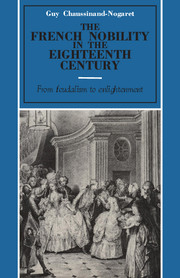Book contents
- Frontmatter
- Contents
- Introduction: the gilded ghetto of royal nobility
- 1 The Enlightenment and noble ideology
- 2 The nobility between myth and history
- 3 Plutocrats and paupers
- 4 The fundamental divide: culture
- 5 The nobility and capitalism
- 6 Rites and strategies: the marriage market
- 7 The nobility against the Old Regime
- 8 A plan for society
- Conclusion
- Afterword to the English edition
- Notes
- Bibliography
- Supplementary bibliography
- Index
Afterword to the English edition
Published online by Cambridge University Press: 05 June 2012
- Frontmatter
- Contents
- Introduction: the gilded ghetto of royal nobility
- 1 The Enlightenment and noble ideology
- 2 The nobility between myth and history
- 3 Plutocrats and paupers
- 4 The fundamental divide: culture
- 5 The nobility and capitalism
- 6 Rites and strategies: the marriage market
- 7 The nobility against the Old Regime
- 8 A plan for society
- Conclusion
- Afterword to the English edition
- Notes
- Bibliography
- Supplementary bibliography
- Index
Summary
The French edition of La noblesse au XVIIIc siècle ended there. That decision seemed justified by the unity I wished to give to an argument which the cahiers of 1789 seemed to round off. To go further would have been to write another book, take another course, and broach new research on the nobility in the Revolution. So the book in a sense stopped short, leaving the reader still hungry and, given what was known of the attitude of the majority of the nobility since the meeting of the Estates-General, took a line which seemed to give the lie to all later developments. So it seems useful, for the English-language reader, to add some explanations which I hope will resolve this apparent contradiction.
The nobility is more or less roundly associated in France with ideas of counter-revolution, emigration and plots. It is no part of my intention, to be sure, to deny the reality of the reaction, or even to attempt to play it down. But what needs to be explained is both the reason for a turnabout which might be found surprising, and the breadth of a conversion that nothing seemed to presage. Since the nobility throughout the eighteenth century had shown itself hostile to absolutism, and expressed in its cahiers a liberalism and a wish to see the regime transform itself into a constitutional monarchy tightly controlled by a national assembly, it can only come as a surprise to see it flying to the help of this same absolutism and fanatically opposing all the decrees of the Constituent Assembly.
- Type
- Chapter
- Information
- The French Nobility in the Eighteenth CenturyFrom Feudalism to Enlightenment, pp. 168 - 173Publisher: Cambridge University PressPrint publication year: 1985



